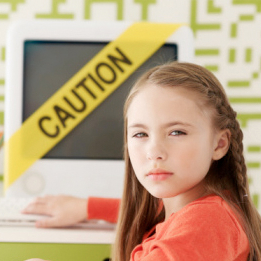Cyber Safety: Removing Internet Access Won’t Protect Your Kids.


It is very important for parents to remember that there are some fantastic benefits to having a world of knowledge, instantly at your fingertips. Although there are tons of things to do online – there are really three main things that your kids, and probably even you, use the Internet for: entertainment, education and communication.
However, as with most things in life, where there is good, there is bad. Cyber safety has become one of the main concerns for parents around the world. And like it or not- the Internet is here to stay. It is very important for parents to remember that there are some fantastic benefits to having a world of knowledge, instantly at your fingertips. Although many parents would rather just remove all Internet access from their homes in hopes of keeping their kids safe from cyber bullies– it is not the answer. Children who do not have access to information and communications technology may find themselves disadvantaged in future school and employment situations, and we certainly would not want to do that to our kids. Children have access to the Internet via numerous channels such as gaming systems, friends, Internet cafes, libraries, schools and smart phones; so forget about the idea of avoidance. It won’t work.
One of the reasons that the online world is so dangerous for children is that kids often know more about technology than their parents about how it works. Kids, however, are not experts at detecting danger, nor do they know how to protect themselves completely. As a result, they can be lured, tricked and drawn into dangerous situations.
Supervision with knowledge is the key to cyber safety – parental knowledge that is. Keeping kids safe online is a parenting issue, not a technology issue. We can no longer accept the excuse that goes something like “I have no idea what she uses that thing for and what she does on it!” Like every new stage of parenting, we grow into our children, and the Internet is no exception. We need to keep up to date with what our kids are doing on the Internet and what the benefits and risks are associated with that usage.
Let’s start with the difference between the Internet and the World Wide Web. Although most people refer to the World Wide Web as the “Internet or Net” they are actually two different things. The Internet was invented by the United States Department of Defense in 1969 for military use to assist in communication between bases. The Internet refers to a worldwide network of interconnected computers. These computers all use a common code to talk to each other.
The World Wide Web is different. It is all the websites that you look at and go to when you are on the Internet. It consists of thousands of websites, chat rooms and web pages that contain just about anything. The World Wide Web is – well – worldwide, and it is available through the internet. WWW was invented by Tim Berners-Lee an English computer scientist, who posted the first website in 1991. Today there are over 43 million registered websites on the Internet and that number is growing every day.
So what does this have to do with your child’s cyber safety? Everything. Because the Internet is a network of interconnected computers, anyone, anywhere with access, can potentially reach your child. Did you know that when your child is online, they are in a public place with upwards of 1.8 billion people? Many of these individuals may have good intentions, others may be more deviant. Understanding that there are risks both inside your home as well as outside should be the first step you take in increasing your child’s cyber safety. Does your child use the Internet outside of your home? Don’t know? Today is the day to ask. Find out where they are gaining access and what they are doing online. This is particularly important if your children are older and are online when you are not there. You may be surprised at what you learn.
Open up conversations based on social netiquette with your children every chance you get. Perhaps there has been a story on the radio or the evening news that you can use to trigger a conversation about cyber safety and the internet. Classic “what if” scenarios are worth their weight in gold. You might ask a younger child “You are online and someone you don’t know asks for your name, age and where you live – what would you do?” An older child’s scenario might be “Someone you don’t know ‘friends’ you on a social networking site, you check around with your friends and one of them thinks they know who that person is. Do you accept their request?”
There are a number of golden rules in cyber safetythat children should be following when they are online. Don’t give away personal details; don’t accept friends that you have never met face to face and certainly don’t meet people you have met online in real life without an adult being present and it absolutely must be in a public place. A family internet contract is a must; it sets rules and guidelines for children and parents to follow. Most importantly, there must be consequences for if those rules and guidelines are broken – just like there would be in the real world.
We need to teach our children how to be cyber savvy. The Internet is a tool that is not going anywhere, and we need to embrace it. By starting conversations with your children today about where they are going online, who they are talking to, and how long they are allowed to be online we can begin to be proactive and preventative about cyber safety.










